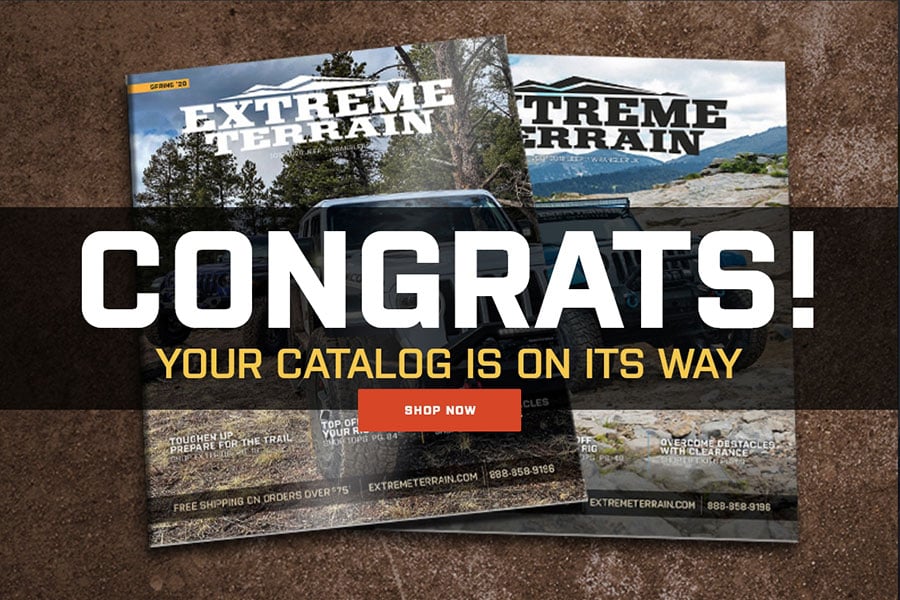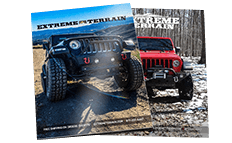The Dangers of Getting Stuck
The alternator and starter have two major roles to fulfill in the vehicle’s operation. One’s job is to get the engine running and the other’s is to keep it running. After enough wear and tear, they will start to cease at performing their duty and you can be left in a tight spot.
It won’t always happen at home or in the garage either. We’ve all been on the side road with a dead battery or stranded in a parking lot with not even so much as a clicking noise when the key is turned.
These situations are awful, but think about it – you’re driving a Jeep. Unless you’ve got a mall crawler you’re going to find yourself in the woods, in puddles, on rocks, and up to your doors in mud. Could you imagine losing one of these two key players in one of those situations?
Sure, you might have a buddy or two with you but you’d better hope they are more than just passengers to get you out of the woods. There’s a little bit of science involved with electrical upgrades, but not necessarily anything you’ll have to go too nuts with. We’re going to dive into the basics of selecting an upgraded unit, starter or alternator, to keep you from crawling around in the mud without any wheels.
Jeep Wrangler Alternators
You own a Jeep Wrangler. You are going to own some seriously awesome auxiliary lighting at some point. You’re going to pop on some spotlights, floodlights, an awesome light bar, and maybe even rock lights. Why stop there though? You know what makes off-roading even better? Blasting metal, and your factory speakers just won’t cut it.
You’re out riding around; maybe you start to get some flickering in the lights but hey no big deal right? Then the bomb drops. Suddenly the Jeep shuts off, and you can’t get it to start. Sounds kind of like a dead battery.
You may have spent some good coin on a beefy battery, but that still couldn’t save you. The reason is the factory alternator couldn’t produce enough power to keep the battery charged up. The factory alternator is only designed to keep up with the factory equipment.
As you add on more and more 12-volt accessories, more power will be drawn from the battery. The alternator has to be able to provide the proper charge or you will find yourself in a situation like such.
If you’re on the roadside it sucks but really is not that big of a deal. Swapping an alternator out is a fairly easy job to perform, and if you pull the vehicle to a safe spot you can fix it then and there, assuming you’ve managed to get your hands on the replacement.
If you’re out in the woods the same thing applies, but getting out to civilization would be a major obstacle in your rescue attempt. If it’s dark out, well, you’re kind of up a creek.
Seeing as it’s an easy enough job and beefy alternators are fairly affordable, you’re better off addressing this before it goes wrong. If you’re planning on making an expensive amount of upgrades to anything that relies on the 12-volt system, you’re going to want to upgrade your alternator before you wind up in a sticky situation.
Symptoms of a Failing Alternator
- Dimming, flickering lights
- Battery not charging
- Loss of Power
When to Upgrade your Wrangler’s Alternator
- When adding lights or other upgrades that draw power from the 12-volt system
Jeep Wrangler Starters
Making upgrades to the 12-volt system won’t really affect the starter. The most important time to beef up the starter is when you’re building a high powered engine that will require the starter to work harder in order to get it up and running.
Compression drastically affects the starter’s role. Whether the engine is upgraded with taller pistons or smaller combustion chambers, the starter will have to work against the compression during its cycle.
Additionally, friction within can give a starter trouble as well. Longer strokes and bigger bores add up to more friction. The quick point – when an engine is heavily modified, it will need a more powerful starter motor.
You can work up a Wrangler engine to produce more power than stock, but unless you’re going all out you likely won’t have to worry about this being much of an issue for you. Giving this a little more attention is worth your time for piece of mind though.
Aftermarket units are produced to take the regular abuse your Jeep will see in its lifetime. You likely won’t keep your engine running when you’re moving from spot to spot on the trail. You’ll probably be starting the engine over and over, and this is what will kill your factory starter.
Companies produce aftermarket starters designed to hold up against this beating and keep you from getting stuck. It might be a beautiful place when all is well, but you’ll certainly grow bitter when your starter fails out there. Diagnosing a dead starter is pretty easy to do.
If the battery has a full charge and the charger only clicks but doesn’t turn the engine, that’s a dead giveaway. If the starter begins to smoke you’re pretty much in the same boat, just further up the creek. If it’s only a slower start be sure to check the battery’s charge level. If the battery has low voltage you may want to check the charging system and look for some signs we discussed under the alternator section.
Symptoms of a Failing Starter
- Slowed starting
- Clicking sound when trying to start
- Smoking alternator
When to Upgrade Your Wrangler’s Starter
- When the starter will undergo more regular abuse than normal
Fitment Includes:
- 1976, 1977, 1978, 1979, 1980, 1981, 1982, 1983, 1984, 1985, 1986, 1987, 1988, 1989, 1990, 1991, 1992, 1993, 1994, 1995, 1997, 1998, 1999, 2000, 2001, 2002, 2003, 2004, 2005, 2006, 2007, 2008, 2009, 2010, 2011, 2012, 2013, 2014, 2015, 2016, 2017, 2018, 2019, 2020, 2021, 2022, 2023 and 2024 Jeep Wranglers
- Rubicon, Sahara, Sport S, Sport, Unlimited, Islander, Rocky Mountain, Renegade Wranglers
*Please see product pages for any exceptions.






